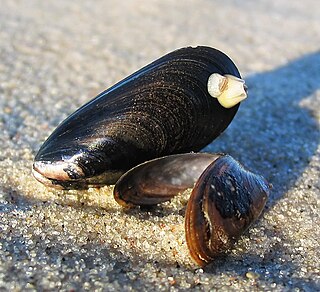| Choromytilus | |
|---|---|
 | |
| Choromytilus chorus | |
| Scientific classification | |
| Kingdom: | Animalia |
| Phylum: | Mollusca |
| Class: | Bivalvia |
| Subclass: | Heterodonta |
| Order: | Mytiloida |
| Family: | Mytilidae |
| Subfamily: | Mytilinae |
| Genus: | Choromytilus Soot-Ryen, 1952 |
Choromytilus is a genus of mussel, a marine bivalve mollusc in the family Mytilidae. [1] [2]
A genus is a taxonomic rank used in the biological classification of living and fossil organisms, as well as viruses, in biology. In the hierarchy of biological classification, genus comes above species and below family. In binomial nomenclature, the genus name forms the first part of the binomial species name for each species within the genus.

Mussel is the common name used for members of several families of bivalve molluscs, from saltwater and freshwater habitats. These groups have in common a shell whose outline is elongated and asymmetrical compared with other edible clams, which are often more or less rounded or oval.

The Mytilidae are a family of small to large saltwater mussels, marine bivalve mollusks in the order Mytiloida. One of the genera, Limnoperna, inhabits brackish or freshwater environments. The order has only this one family which contains some 52 genera.




